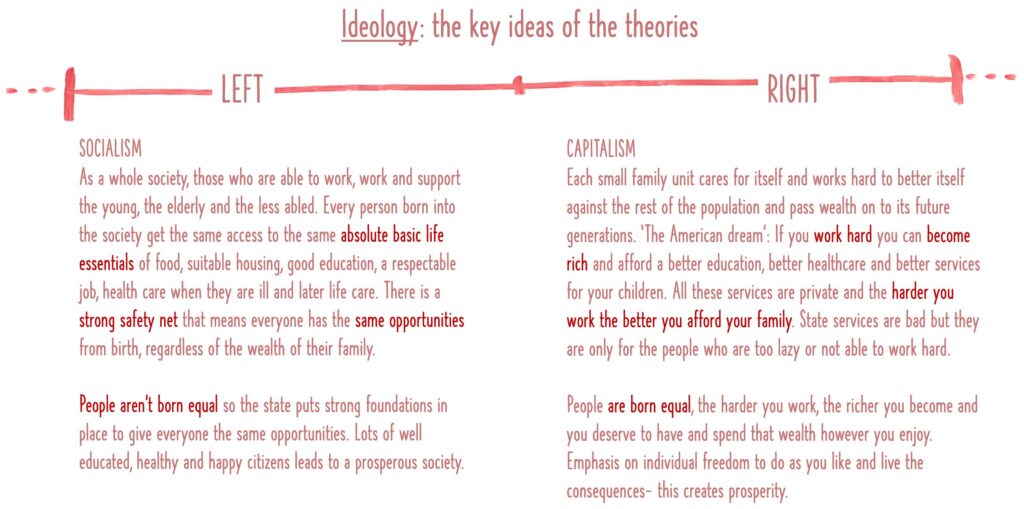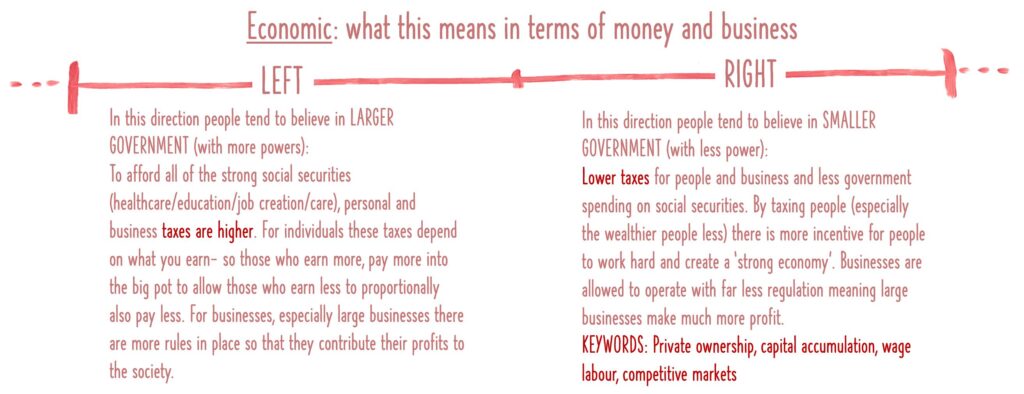How should Society be run?
This post explains socialism and capitalism and how each present alternative ways of how society should be run!
I’m Daniela, I have a great life but sometimes I fell so detached and powerless against all the complicated ways the world works! I want to understand my purpose, my place and my responsibility. I’m creating this community as I go of people who just want to understand more things and engage with the world more consciously. Here we go for this post on:
What are socialism and capitalism?
Socialism and capitalism are opposing philosophies for how societies can be run. Socialism says that everyone should be awarded life basics and equal opportunity at birth. Capitalism says everyone is born equal and thereafter, the harder you work, the more you can afford for your family. If you snooze, you lose.
One way to describe opposing ideals is on a “number line” from left (where socialism lies) to right (where capitalism lies).

Socialism is…
Socialism is a value of a collective society. Those who are able to work, work to support the young, the elderly and the less abled. Every person born into the society get the same access to the same basic life essentials of food, suitable housing, good education, a respectable job, health care when they are ill and later life care. These absolute life necessities are called ‘welfare’. Socialism creates a baseline ‘starting-point’ which means everyone has the same opportunities, regardless of the wealth of their family. The idea is: well educated, healthy and happy citizens leads to a prosperous society. Practically, this means that the government have more control and spends more on public services- to do this it will ‘take-in’ more money through higher taxes.
…and capitalism is
Capitalism is like the ideology of ‘the american dream’: if you work hard you can become rich. Each small family unit cares for itself and works hard for better quality of life and to pass wealth on to its future generations. More money affords better education, healthcare and other services. If you lose your job you’ll be stuck, so there is high incentive to work hard and be productive. The government has little power and does less spending on behalf of its people. As a result, taxes are much lower but you pay for services yourself.
Economics of Socialism and Capitalism

What are socialist economic principles?
Socialist economics support larger governments with more powers. To afford all of the strong social securities(healthcare/education/job creation/care), personal tax and business tax are higher. Individual taxes depend on what you earn, those who earn more, pay more. For businesses, especially large businesses, they are taxed to also contribute to the society they operate in.
In a socialist society, ‘value’ doesn’t come from how expensive a product is to produce. It comes from how many hours it has taken to produce that product. This means that someone who contributes to the society by nursing creates the same value for that society in one hour compared with someone who spends one hour being a doctor (or a banker). In a socialist society, ‘value’ doesn’t come from how expensive a product is to produce. It comes from how many hours it has taken to produce that product. This means that someone who contributes to the society by nursing creates the same value for that society in one hour compared with someone who spends one hour being a doctor (or a banker).
What are capitalist economic priniples?
Capitalist economics support a smaller government with less power. People pay lower taxes but there are fewer state services. Instead, they pay for services privately, meaning they have more control on what they buy into. Capitalism believes that the most effective economy is run by the free market. In other words, government shouldn’t interfere with the natural trends of the market.
In order for the market to work freely, people should be able to chose every service they use. This means they are voting for the best services with their feet. Only the best healthcare, education, businesses get custom. This created a competition amongst these sectors. They will all work really hard to make their offerings as good and as cost competitive as possible. Everything on offer will be highly optimised and efficient. (I don’t personally believe this is good. See my related posts on problems with capitalism and value of healthcare)
What are socialism and capitalism in the real world?
Most of the developed western governments that you imagine are capitalist societies. Some have more socialistic tendencies than others (eg Sweden/Germany/France all have more welfare than the USA). People use terms like hard left / centre left / hard right. When they do this they’re referring to an idea of a position on a number like that in the picture below. No ideology is attached to any specific ‘number’ on that line. What Germany considers ‘centre’ is very different to what the US considers ‘centre’. I have another post on what left and right wing mean.

A lot of the language around by politicians is emotive- when someone says ‘extreme left’ or so- it’s not clear at all what that means. Instead, it’s a point of comparison to something and you have to know what that something is to make sense of it. Americans considered Bernie Sanders ‘far left’ even though a lot of the policies he was campaigning for exist under right wing governments in Europe. A good bit of context can help decipher how much sense a politician is talking very quickly!
This post covers the key values and concepts. In other posts I go more into the economic principles. See here for socialism and here for capitalism.
Some context
There are some amazing examples of very strong economies that have some very socialist principles or who are run by people that consider themselves socialist in their attitudes, but also exist within a capitalist world. Scandinavia is an example of a country with extremely high rates for education, life satisfaction, employment etc.
In history, there have been some catastrophic examples of ‘socialist dictatorships’ that have gone terribly badly (Venezuela, Cuba, Russia..). People who are slightly misinformed on exactly what that means assume dictatorships are linked to socialism. The problem in many of these examples was that societies were very poorly led (under the name of socialism or even more extreme communism) and the democratic process of getting rid of unpopular governments could not happen. This means the word ‘socialism’ often comes with baggage that’s not related to the philosophical idea itself.
Summary
So, to summarise, a democracy is a society where the people have some say over who is in charge (for example by voting for the government). Capitalism and socialism are the names for two ideologies. Socialism supports lots of public services. Capitalism supports lots of private services. In economic terms (which is where most of the politics lies) socialism means high taxation and a very big and involved government and capitalism means lower taxation and ‘smaller’ government that gets less involved. We live in a capitalist world so any government who has socialist ideals will do things like increasing welfare etc while still interacting with the capitalist world and financial markets in the same way all other wester democracies do. Socialist economic policies don’t lead to communist philosophy (that jump is massive and has much deeper social implications).
This was just an introduction- I will be creating more content like this about key political ideas that inform how today’s societies are run. Subscribe to this blog to keep up with our weekly posts to, bit-by-bit, break down the complicated world into pretty, digestible chunks 🙂
You might want to read this post on climate change next!
